标签:跳过 ide 北京 except success help ima sleep 是你
1 表方向(东(east),西(west),南(south),北(north))
用到有in,on,to三个,具体的用法如下:
举例:
注:四个方向既是名词,又是副词,举例:往东走---go to the east===go east.
2 表方向(上下)
共有6组,见下图:
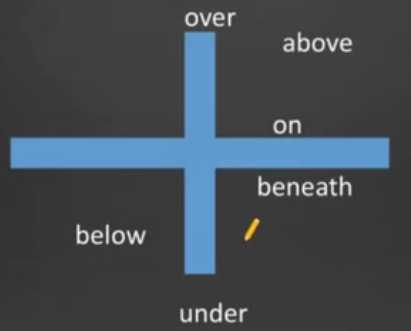
其中:
注:(1)over,above有时区分不明显,举例如下:
我们将要飞过中国---we are going to fly over/above china.
(2)over除了表示正上方之外,还表示在物体表面的上方,与on的区别是:over表示覆盖。举例如下:
他用手捂住了脸---he puts his hands over face.
(3)数词,量词还可修饰a,adv,介词短语,还有表程度的词,举例如下:
我迟到了五分钟---i am five minutes late.
3 表方向(前后)
表前后的有八组,见下图:
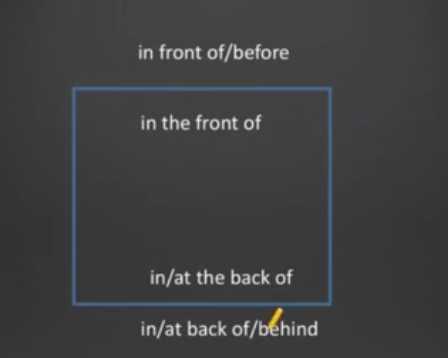
其中:in the front of / in/at the back of 表示物体内部的前后;in front of/before / in/at back of /behind 表示物体外面的前后。举例如下:
他站在车前---he is sitting in front of car.
教室后边有一块黑板---there is a blackboard in the back of classroom.
4 表周围和附近(5个)
共有5个表示附近的介词,距离远近不一样,先看下图大致了解一下,然后在解释:
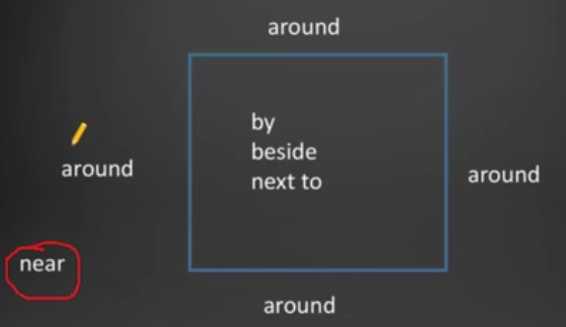
其中:
举两个例子:
1 我家附近有许多餐馆---there are many restaurant near/around my home.(around表示环绕着我家附近;near 表示 在我家附近的某一块)
2 电视挨着窗户呢!TV is by/beside/next to window.
5 表中间(3个)
between表示“两者之间”;among表示“三者及三者以上中间”;in the middle of 表示“三者及三者以上正中间”,图示如下:
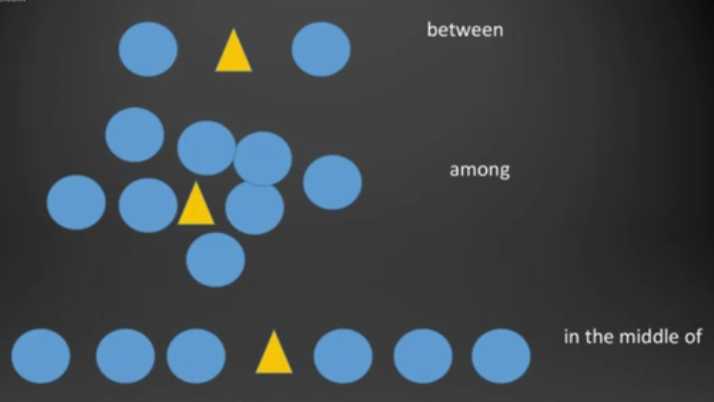
举几个例子体会一下:
6 表穿过
over表示从物体上方穿过(比如“从墙上穿过”);across 表示横穿(没有目的的穿过);past/by表示从物体旁边穿过。图示如下:
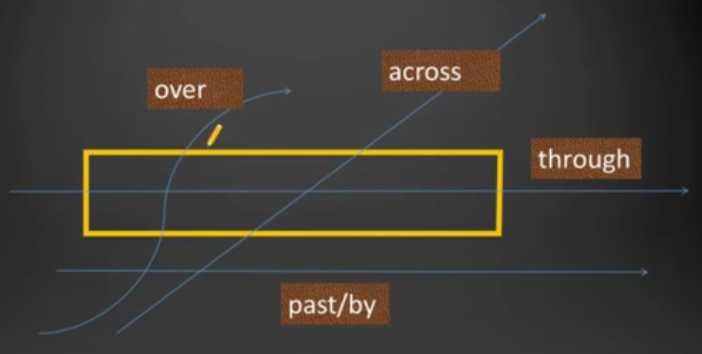
举几个例子:
he ran across the street.
go through the door,you can see the bathroom.===you can see the bathroom go through the door.(走过去)
through the door,you can see the bathroom.===you can see the bathroom through the door.(目光穿过)
he jumped over the wall.
he went by/past me.
7 表代替
instead of : 介词;instead : 副词。
举例体会:
he stayed at home instead of going out.===he did not go out,he stayed at home instead.
i went to beijing instead of him.
8 表根据
according to : 根据;based on :以......为基础。
举例如下:
according to / based on his expression/look,he failed.===he failedaccording to / based on his expression/look.
9 表除了
besides:表示包括除了的那部分;except :不包括除了的那部分。可能有的难懂,举两个例子立马就明白了:
10 表在......前面
ahead of : 表示在......前面(能力,地点,时间方面)。分别举例:
11 表至于
as for
举例:至于这件事,你就不用管了---as for this matter,you leave it alone.===you leave it alone as for this matter.
12 表原因
due to/owing to/becasue of/on account of/as a result of:翻译为“由于”
举例:
由于交通堵塞,他来晚了---he came late due to/owing to/becasue of/on account of/as a result of heavy traffic.
由于他马虎犯的错已经被改正了---the mistaks due to his careless have corrected.
注:当作定语时,只能用“due to”,当表示原因状语时,都可以使用。
13 表多亏了
thanks to
举例:多亏了你的帮助,我们才得以成功---we succeeded thanks to your help.
注:成功的动词:succeed;成功的名词:success;成功的形容词:successful。
14 另外一些比较隐蔽的小众表示原因的介词
for/at/from/of/with/by/out of/through
举例:对于你的损失,我干到抱歉---i am sorry for your loss.
举例:听到这个消息,他很惊讶---he is surprised at hearing this news.
举例:他死于车祸---he died from car accident.
举例:他死于心脏病---he died of heart diease.
举例:他激动的跳了起来---he jumped with excitedment
他喜悦的留下了眼泪---he burst into tears with joy.
举例:我弄错了拿走了他的包---I took hisbag by mistake.
举例:他出于好奇打开了那扇门---he opened the door out of curiousity.
举例:他们完成了任务是由于团队合作---they completed the work through teamwork.
15 表关于
of : 表示浅显的关于;about : 一般的关于;on :正式的关于。
举3个例子就很好理解:
16 表像
like 有两个词性,动词表示“喜欢”,介词表示“像”。举例体会:
17 表作为
as:作为;
in exchange for :作为......的交换
in return for :作为......的回报
in reward for:作为......的奖赏
举例体会:
标签:跳过 ide 北京 except success help ima sleep 是你
原文地址:https://www.cnblogs.com/Terrypython/p/10479627.html